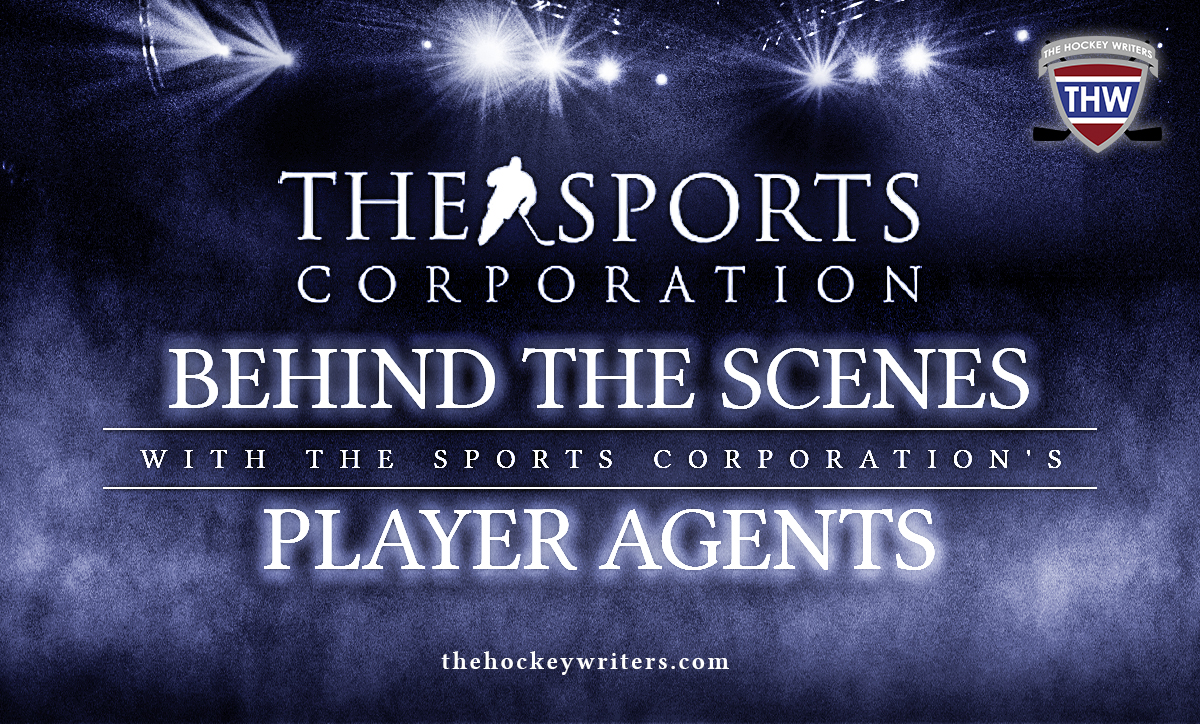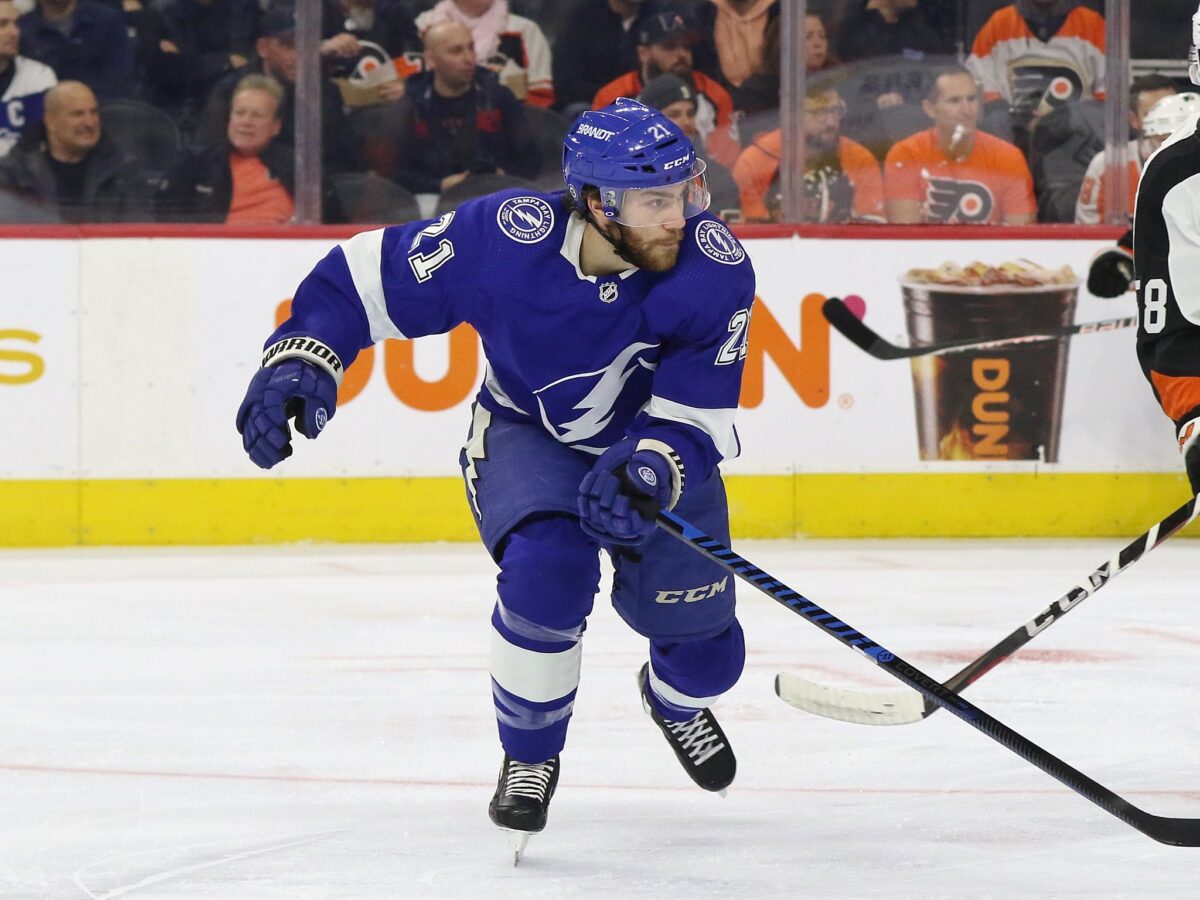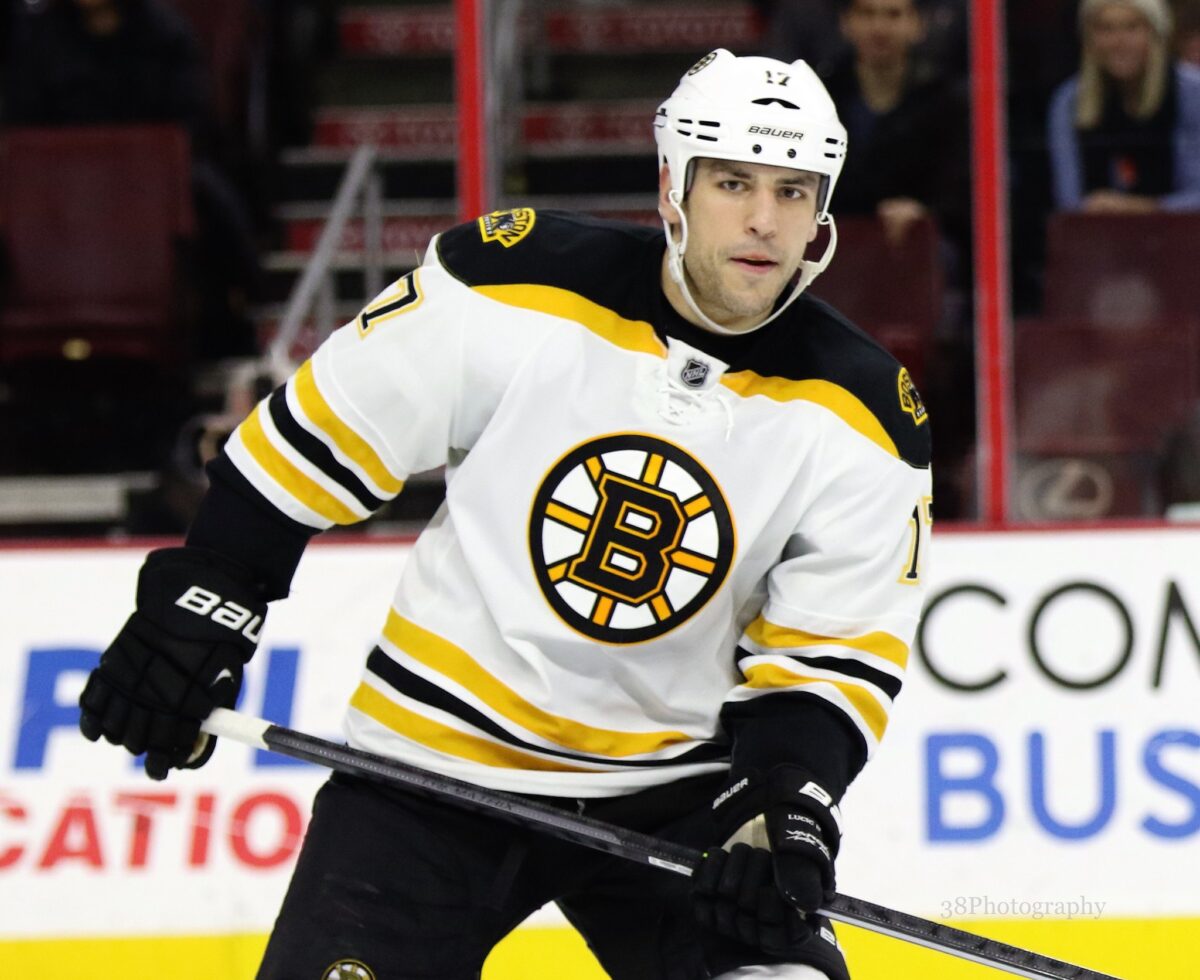While they aren’t in the spotlight often, agents play an important role in the hockey world. From the draft all the way through a player’s retirement, agents like the ones at The Sports Corporation help and advise hockey players with everything from contract negotiations to offseason training sessions. They play a significant role in the NHL, despite mostly staying behind the scenes.

Since 1985, the Sports Corporation has represented players from across the hockey world. Whether it be current NHL stars like Sebastian Aho, Brayden Point and Josh Morrissey or top prospects like Juraj Slafkovský, Lukas Dragicevic and Kevin Korchinski, their team has a proven track record of being one of the top agencies in hockey. To learn more about the role agents play in a player’s career, here is a look behind the curtain courtesy of Senior Vice President Scott Bonner and Chief Operating Officer Manny DeSousa.
Working With Junior Players
Before players are drafted into the NHL, they need to earn the opportunity in junior. One of the most common routes is through the Canadian Hockey League (CHL). Just like teams do, The Sports Corporation does plenty of scouting to determine which players they are interested in working with throughout their junior careers.
“Much like the Western Hockey League (WHL), we will watch them pretty much in their Bantam year,” said Bonner. “We’ll start talking to a lot of the best players prior to the Bantam Draft, and figure out the guys that we think have a chance to be pro players. A WHL team would look at players to fill a roster or a team. In our case, we’re looking for sort of the best of the best because we’re not really looking for the best juniors; we’re looking for potential pro clients down the road, which usually would mean those are the guys that are in the running for Hockey Canada teams.”
When The Sports Corporation and other agencies identify which players they want to work with, they can’t just sign them on the spot. They need to wait until the player has either been drafted or is on the verge of signing their first contract. As Bonner explains, though, they still work with the player throughout their junior career and start building the relationship for the future.
“The only time that anything is signed is once they get to the NHL level and they’re signing an NHL contract. Much like teams, we watch a lot of hockey and use a lot of resources in team personnel within WHL teams or Junior A teams. Once we identify the players that we want to work with, we try to set up meetings and see if our business model meshes with the clients or the families’ values. If it does, (we) start a relationship. From that relationship, we provide advice; we’re almost in the advice business, which is pretty much what the agents do. Once they get to a pro-level when they’re signing contracts, needing insurance, sort of the business support staff that’s sort of the other arm of our company. We have people like accountants, negotiators for contracts, disability policy, companies, insurance companies do stuff like that.”
Related: Jets 2022-23 Player Report Cards: Josh Morrissey
The NHL Draft is a special time in a player’s career. It is the culmination of all the time and effort they have put in, with the big reward being they get to call themselves an NHL prospect. As Bonner details, this is a busy time for not just the players but also his team as players get set to attend rookie camps and sign their first NHL contracts.
“The NHL Draft, which would usually be late July, they’ll usually go right from the NHL Draft to a development camp. If the player does well with the development camp, usually, the team will approach us and say they want to make the player an offer. The negotiations traditionally don’t take very long, and then the player signs. Then, the second wave of the company kicks in. There’s tax stuff that starts to happen. So setting up some banking, basically adult stuff, because a lot of the kids that we’re dealing with, they’re in junior. The teams do a very good job of planning the player schedule; what they’re going to do week to week, month to month, it’s all very structured. When they go pro, I’m not going to say you’re on your own, but it’s where the players need more support away from hockey. Our job is to make sure that the details are covered, and that’s very important.”
Building Relationships
Having strong relationships with their clients is a major part of why The Sports Corporation has been so successful for a long period of time. The agents will work with players all year long in order to build up a level of trust so that when contract negotiations happen, or other issues may arise, the player is confident that they will be taken care of. According to Bonner, this is a crucial part of the industry.

“We follow them closely. We’ll help because players will say they’ll have injuries, so we need to get them associated with the right doctor. Guys are getting married; you’re helping them through different things like insurance, health coverage, medical coverage. We might find them a shooting coach, skating coach, different trainer, so you basically try to help cover anything that the player needs. Every player is different so you got to identify what each player’s needs and/or weaknesses are and help supplement it.
“It’s all about relationships; I think what’s happened is because we generally get involved with the player at a fairly young age, and we’ve helped them through junior, and then in the pro, they get to know us, and we know them pretty well. Generally, our job is to explain the upside and the downside of any deal in any situation. A player always has the final say; our job is just through experience to provide them with as much detailed information as we can so that they make the right choices.”
The Complexity Of Contracts
Contract negotiations are complex, to say the least. Agents have to navigate many obstacles, including a team’s salary cap, the rules of the CBA and the preferences of the players. They also can take different amounts of time, as Bonner and DeSousa explain, with teams potentially circling back later in the offseason.
“There could be times when a player or the team phones as early as 1:00, and you’ll have an agreement by 1:30,” said Bonner. “The challenge now is teams are always up against the cap or some teams have a self-imposed cap. So just because the NHL says this is what you’re allowed to spend doesn’t mean every team is comfortable spending it. The deals can be done. Some are done quite easily and quite quickly, and others take a little longer because basically the team, in some cases, is challenged by their cap; that’s why you’ll see, at times, deals take a while. You’ll see that a team will make a trade, player A is gone, and all of a sudden, they’ve freed up cap space, and then the deal gets center.
“There are only 32 teams you can deal with in terms of trying to find a contract,” said DeSousa. “We might circle through a team multiple times. Things change. They might have a draft pick who they thought they were going to sign, a player who doesn’t sign, or you have a player that they anticipated was going to come from Europe and move to North America, and he decides he’s going to stay an extra year, or they make a trade. If you take a look at free agency, there are still quite a few players. And you take a look at rosters; not everybody’s at 12 or 13 forwards that they’re committed to right now.
“A lot of business gets done early, and then teams take a break, and then they’re going to re-evaluate. Those conversations will happen throughout the summer as we get further along. They’re not in so much of a hurry. They just have to get something done before camp, and then you’ll see guys go on PTO trials. Most of the roster right now would be set, but there are still a couple of guys that they’re not sure about, or they’re still restricted [free agents]. Certain free agents don’t have contracts; what’s that going to look like? Do they think they’re going to have something done? Do they think there’s going to be a holdout? There’s still a variety of factors that play into it.”
Related: Canucks: 5 Cool Things About Carson Soucy
During the negotiation period, there will be many different factors that will play into what the final contract will look like. One of these factors is whether or not a player is willing to take less to play for a certain team. This is often referred to as a “Hometown Discount,” and as DeSousa explained, it can be something agents are already thinking about long before contract negotiations ever start.
“The thing I would say is that you’re talking to these guys constantly throughout the year, not just when their contract is up. Most of the guys that we have, we would have been working with since the age of 16, or 15, or 14 years old, so you’ve gotten to know the player; you’ve gotten to know his family and as they get older, you get to know the wife. At that point, you kind of have a pretty good feel for what’s important to him. We’re still taking direction from the player but it’s our job to educate the guys as to what their value is in the marketplace. You’re deferring to your client a little bit about what is important to him and what you want to prioritize in terms.
“I say this to players all the time; it’s not just the average annual value (AAV) that’s important. In some instances, having a no-move clause is really important, or sometimes structure, or sometimes the signing bonus is important. Those are things that add up in terms of what looks like a good contract, not just always the most amount of money.”
As DeSousa mentions, money is not the only important factor when it comes to contracts. No-move or no-trade clauses can make or break a contract negotiation. As he explains, when negotiating deals where no-move or no-trade clauses can be included, it usually is an ask from the players’ side as they want some sort of insurance long term.
“You can only have a movement clause if you’re basically a free agent, so you’re dealing with a smaller section of players that are signed to contracts. It’s something the player does when he hits free agency, and he has some leverage. If you’re dealing with a player who’s evolved to be a free agent, you might want it as a condition of doing a long-term deal. The player wants to know that he’s going to be there awhile, and you might push for a movement clause, whether it’s a full no-move or no-trade or modified no-trade. So again, a combination of factors that kind of goes into the requests being made, but I would say usually, it’s from the player side.”

Lastly, agents want to ensure their clients are getting the best deal possible, so they will use contract comparables from around the league and historical contracts from the specific teams in the negotiation. This is an agent’s best bargaining tool as they negotiate contracts with different teams. This is a tactic that Bonner says is how a large portion of deals in the NHL are negotiated.
“You look at what teams traditionally have done, and then you’ll provide comps. When we go in to negotiate on the player’s behalf, we will have comps from other players in the league that have done similar performance levels to what they are. We’ll go through the player, explain the comps, what each player makes and what it looks like they should be making. Then we have to go to the team and then the teams will do the same and they’ll have their comps. That’s how the negotiation basically works, but a large part of the deals are based on comps.”
In the end, negotiations are complex, with every player wanting something different. There are also other factors, including whether or not the player is eligible for bonuses, that need to be ironed out before a deal is complete. While it may seem like it’s easy for teams and agents to negotiate new deals, as shown, it takes a lot of work and includes a massive amount of planning, often not seen by the public.
The Important Roles Agents Play
Whether it is a junior player signing their first pro deal or a 17-year NHL pro signing their last, agents play a crucial role throughout a player’s career. Whether it is The Sports Corporation or another organization, it is important to remember that agents do much more than just negotiate contracts every few seasons. Often in the background, a good agent does whatever they can to ensure the success of their clients and their agency.
